
Mission Statement:
"To advance through research, education and symposia, an increased public awareness of the Cape Fear region's unique history."

Colonel John Douglas Taylor
Legislator, Soldier, Public Servant
Cape Fear Historical Institute Papers
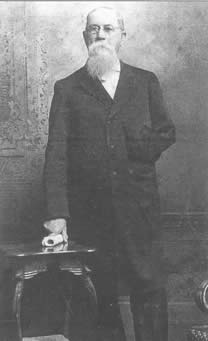
Col. John D. Taylor has been described as
“A gentleman, one of the most worthy of the many
estimable citizens of Wilmington.” A planter, legislator,
soldier and public servant, he was born in Wilmington on
24 March 1831, the son of John A. and Katherine
(Harris) Taylor.
His father was a native of the city of New York,
“but removed to Wilmington in 1820, where he
married and lived for many years, and died at a ripe
old age, carrying with his to the grave the respect
of the entire community.” John A. Taylor was a
successful business man who for many years acted
as agent for a line of mail steamers plying between
Wilmington and Charleston and owned his own
steamer "Calhoun." He also operated a Cape Fear
River ferry and was involved in regional transportation
and railroad operations.
Frequent house visitor Ellen Douglas Bellamy later wrote
that "This house was wonderful, not only handsome
on the outside but beautifully furnished." She also
mentioned Mr. Lamb, a gardener whom Mr. Taylor
had brought over from Ireland.
Early Life
John Douglas grew up in the distinctive Classical Revival marble-veneered house his
father had built in 1847 on the north side of Market Street
near Fifth Street, which was owned after the war by
Major Charles Stedman, who later sold it to the
Wilmington Light Infantry. The family unit included
“Grandma Leary” who was actually an aunt who had
come for a short visit from Ireland but stayed forty years.
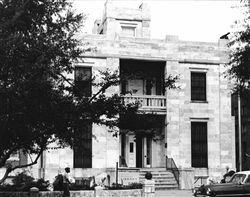
Time was spent between this home house and The Oaks,
the family plantation near Town Creek and just above
Lilliput in Brunswick County, later known as Pleasant
Oaks after purchase by Robert Bellamy. This plantation
was originally granted in 1728 to the widow of
John Moore, brother of Maurice and Roger.
John D. was prepared for college at the Hillsboro Academy
under Dr. Alexander Wilson and in 1850 entered the University
of North Carolina, enrolling in the sophomore class and
graduating with an A.B (atrium baccalaureus) degree in
the class of 1853. Taylor delivered a valedictory in his
UNC Dialectic Society which was said to be “so full of
noble sentiments and expressed in such pathetic language
that many of us were melted in tears.”
After graduation he made a four-month tour of Europe
where he met famous Parisians including James McNeill Whistler,
and returned home on one of the first steamers that ever
crossed the Atlantic.
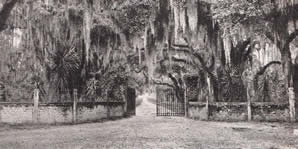
Early Career
Engaging in rice planting in Brunswick and Bladen Counties,
he was one of the last planters of that staple in the
Cape Fear region. In 1860 Taylor was elected on the
Democratic ticket a member of the State Senate from
the counties of Bladen, Brunswick and Columbus. Like
many conservative North Carolinians, he did not view
the election of the sectional presidential candidate Lincoln
as cause for immediate withdrawal from the Union,
though he never questioned the right of a State to secede
and determine its own political future.
A member of the Legislature that debated the important
question of secession in early 1861, he remained in that
body after the secession ordinance was adopted on
20 May 1861 and assisted in preparing
North Carolina for war.
Wartime Service
After the North Carolina Legislature adjourned in early
February 1862 he returned home to organize an artillery
unit in Brunswick County and was elected its captain.
This battery, known as “Brunswick Artillery,” enlisted
for the war’s duration and mustered in at Fort Johnston
on 19 February as “Captain John D. Taylor’s Company
of Heavy Artillery NC Volunteers.”
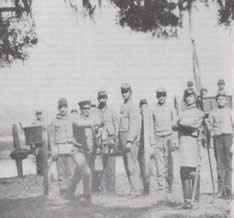
When the Thirty-sixth Regiment North Carolina Troops
(Second Regiment, NC Artillery) was organized on
12 May 1862, Captain Taylor was promoted to major
(effective 14 May 1862) and transferred to field and
staff under Col. William Lamb. First Lt. Daniel K.
Bennett then became captain and the battery was
officially designated Company K, Thirty Sixth NC Troops
and also called “Captain Bennett’s Company.”
When Captain Bennett was dismissed of 13 April 1863
for stealing a leather cargo from the blockade runner Kate,
First Lt. William F. Brooks became captain and the battery
called “Captain Brook’s Company.” Major Taylor was
promoted to lieutenant-colonel on 23 January 1864.
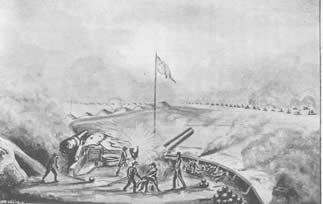
Soon after its enlistment the battery was stationed at
Fort Caswell at the mouth of the Cape Fear River, then to
Fort Campbell on Oak Island, west of Caswell. In late
1864 the battery was transferred to Fort Fisher where it
participated in the late December and mid-January
engagements with the enemy, and many of its men
captured in the latter.
Those who escaped capture, including Lt. Col. Taylor,
united with other batteries to form a detachment of the
Thirty-sixth North Carolina and on 21 January 1865
were assigned to the Fortieth North Carolina (Third NC
Artillery) at Fort Anderson and under the command
of Wilmingtonian Col. John Hedrick.
After evacuating this fort on 20 February, they took
part in the Town Creek engagement and retreated through
Wilmington with Gen. Robert Hoke’s division. Col. Taylor
and his men were entrenched with Hoke at Duplin Roads
(now Wallace) through early March, then departed with
him to oppose the advancing enemy at Kinston on 8 March.
It is ironic that the skirmishes and battles near Town Creek
saw Col. Taylor fight on and around his own family plantation.
Sons John Allan and Walker were born 15 August 1862,
and 26 October 1864, respectively, while their mother
“refugeed” at Marion, South Carolina.
Like many Wilmingtonians, Col. Taylor sent loved ones
to the interior to escape the yellow fever epidemic and
wartime activity in Wilmington. Son John Allan named
a son born in 1892 after his father, John Douglas Taylor, II.
Arm Lost at Bentonville
Assigned to Gen. Johnson Hagood’s Brigade of Hoke’s
Division, Gen. William Hardee’s Corps, Col. Taylor led
his 267 “Red Infantrymen” (because of their traditional
artillery uniform red-facings) of cannon-less artillerists
against the enemy at Bentonville in mid-March 1865.
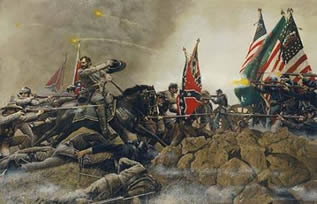
At the front of his advancing men as they reached the
enemy breastworks, Col. Taylor was shot down by
a Yankee from no more than twenty paces away, his left
arm shattered by the rifle fire.
An enemy counterattack drove back Col. Taylor’s men
and by the time they regrouped only numbered 115 men
unscathed or fit for duty. In that sharp engagement every
officer of his regiment was either killed, wounded or
captured, except Taylor and one other.
Col. Taylor was sent to the rear for hospitalization at
Raleigh. The battle ended in a stalemate more or less,
and demonstrated the high casualties the South could
expect when their muzzle-loading Enfield rifles opposed
the new Henry repeating rifles of the well-equipped invader.
The surrender of Gen. Joseph E. Johnston’s army took
place on 26 April 1865, which released Col. Taylor for his journey
home to enemy-occupied Wilmington and his family.
Postwar Life
After the war Colonel Taylor resumed his agricultural work
at The Oaks, and in 1877 he was called upon to fill the
unexpired term as the Clerk of Superior Court in Wilmington
in place of a Republican who had been deposed for
malfeasance in office.
In 1884 he was elected City Clerk and Treasurer
of Wilmington and served several terms; in 1890 was
elected Clerk of the Superior Court and filled that
position for twenty-two consecutive years, being
re-elected five times without opposition.
He also served as a probate judge.
He was the first Commander of the Cape Fear Camp
of United Confederate Veterans, and throughout his life
remained deeply loyal to the fine traditions of the old South
and its military glory.
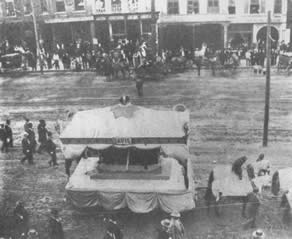
Upon the death of President Jefferson Davis in early
December, 1889, Col. Taylor presided at the large mass-meeting
and memorial service in Wilmington. In addition to his remarks,
"eloquent and feeling addresses were delivered by
Hon. George Davis, ex-Attorney-General of the
Confederate States; ex-Lieutenant-Governor
[Charles M.] Stedman, Hon. A.M. Waddell,
Dr. T.H. Pritchard, and Rev. W.S. Creasy."
For over twenty-six years, Col. Taylor was ruling elder
in the First Presbyterian Church of Wilmington.
On November 9, 1859 Col. Taylor married Miss Sarah
Elizabeth Walker, a niece of Daniel Russell, Sr., of
Brunswick County. She had been reared from infancy
by Russell after the death of both parents in Mississippi.
Born on 21 August 1839, she was educated in the
French Academy conducted by Madam Clements
at Wilmington, and at Raleigh’s St. Mary’s College.
Mrs. Taylor is described as “a woman of the greatest
nobility of character, and she and Colonel Taylor for more
than half a century shared each other’s troubles and
triumphs and the joys and sorrows incident to the
rearing of a large family of children.”
In 1909 they had celebrated their golden wedding
anniversary in the midst of their children and grandchildren.
Death separated them only a short time, she having passed
away March 8, 1910, a little more than a year before the
death of Colonel Taylor. Their eight children were:
Mrs. P.B. Manning, John Allan Taylor and Col. Walker
Taylor, all of Wilmington; Mrs. C.E. Borden of Richmond,
Virginia; Mrs. A.M. Scales, of Greensboro;
Miss Fannie Taylor, Mrs. W.H. Pemberton and E.T. Taylor.
Miss Fannie later married Samuel W. Travers
of Richmond, Virginia.”
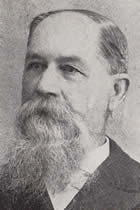
Col. Taylor passed from this life in his eighty-second year,
21 May 1912.
He was eulogized with vivid
descriptions of his exceptional character in life:
“There are few men more popular and more deservedly so than
Col. Taylor. Of genial manners and pleasant address he endears
himself to all. He is one of those men whom one in trouble
would go and not hesitate to unbosom himself freely,
for he would feel assured of warm sympathy,
kindly advice and generous assistance.”
Also: “It is doubtful if he has an enemy in the world, and
he enjoys the fullest confidence of all classes, irrespective
of color or “previous condition of servitude.” He is a man
of the strictest integrity, of great amiability of character,
and above all a Christian gentleman, the highest type
of a true manhood.”
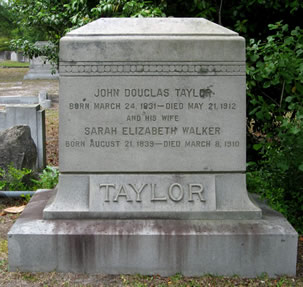
"A Southern Christian Gentleman"
This tribute was published in the Wilmington Star
on 22 May 1912:
"A fellow-townsman recently said to the writer: "I never
passed Col. Taylor upon the street without exercising
the privilege of shaking his hand, because I believe he
exemplified in his daily life, to a remarkable degree,
those virtues which adorn the character of a
Southern Christian Gentleman."
His old-time urbanity, his winsome smile, his almost
womanly tenderness, his general patience, his childlike
faith, drew him to our hearts and we loved him.
Probably no citizen of our community was more
generally respected. There was a quiet dignity
in this serene, devout Christian, which told of conflicts
won while leanring to endure hardness as a good
soldier, and of a peace which passes the under-
standing of this world, which enabled him to look
o'er the heights of toil and sacrifice and find his
chief meed in thoughts of duty alone.
During his long and honored life he inspired the hearts
and guided the steps of worthy sons and daughters in
the way of life, to the end that they might "glorify
God and enjoy him forever." His children rise up
and call him blessed.
In public life he discharged his official duties with diligence,
ability, impartiality and uprightness. Party lines vanished in
the pure light of his moral excellence, and his return to
office at the expiration of each term, without a dissenting
vote, attest the abiding confidence of his fellow-citizens.
Eminent among the local leaders of the Lost Cause,
he believed, with his great chieftain, that Duty is the
sublimest word in our language, "and by it as a pilot
star, he ever steered his steadfast course."
He went into his last battle at Bentonville with
Company A, Captain [Robert G.] Rankin, Company B,
Captain Taylor, Comapny C, Captain Brown, and
Captain [James L.] McDougal's Company, and a
remnant of the Thirty-sixth Regiment, in all 350 men;
and he emerged with nineteen other survivors,
an honorable record, and an empty sleeve.
He sheathed his sword when the cause for which he
fought was lost, but he put on the invisible armor of
the soldier of the Cross, and has fought a good fight
and laid hold on eternal life. The greater number of his
devoted comrades have crossed over the river,
and rest with their commander under the
shade of the trees.
We read that at roll call of the flower of Napoleon's army,
the Imperial Guard, as silence fell upon the utterance of a
name which death had claimed from the arms of victory,
a comrade would step forward from the ranks, and,
raising his hand in grave salute, would answer,
"Died on the field of honor!"
The thin gray line of Appomattox, diminishing day by day
as it yields to the call of the great Conqueror, still closes
up its broken ranks of hoary heads and feeble knees.
Soon it will vanish away and there will be no reverent
comrade's voice to answer the roll call of the dead. But
"Death's truer name is Onward. No discordance in
the roll of that eternal harmony whereto the worlds beat time!"
"The glory born of goodness never dies,
Its flag is not half-masted in the skies!"
In the sessions of his beloved church, our friend will be
gratly missed -- in no circle beyond his beautiful home
life was he more welcomed than in that church of
his fathers.
David Worth, DuBrutz Cutlar, Kenneth Murchison,
William DeRosset, Alfred Waddell, John D. Taylor,
classmates all at Chapel Hill, were the flower of
Wilmington, and they are gone; but to live in the
hearts of those we love is not to die. By the light
of their lofty deeds and kindly virtues, memory gazes
back into the past and is content; by the light of
Revelation, hope looks beyond the grave into the
bright day of immortality and is happy."
Sources:
North Carolina, Rebuilding an Ancient Commonwealth,
Volume IV, American Historical Society, 1928, pg. 401
Cyclopedia of Eminent and Representative Men of the Carolinas
of the Nineteenth Century, Volume II, Brant and Fuller,
1892, pp. 366-367
Catalogue of Members and Historical Sketches
of the Dialectic Society, UNC, 1793-1962
The Jefferson Davis Memorial Volume, J.W. Jones, pg. 643
©2006 Cape Fear Historical Institute